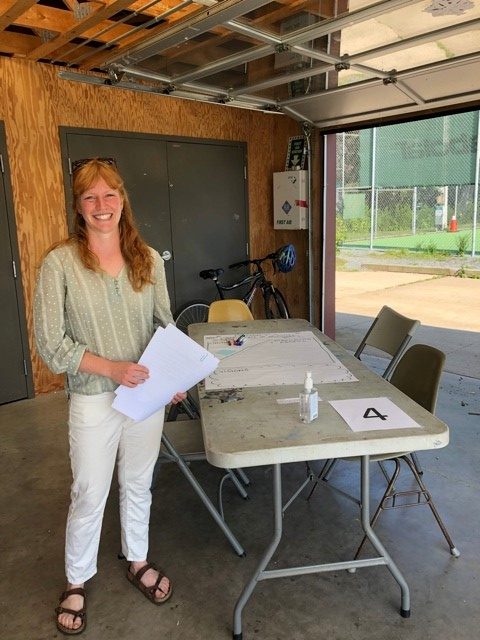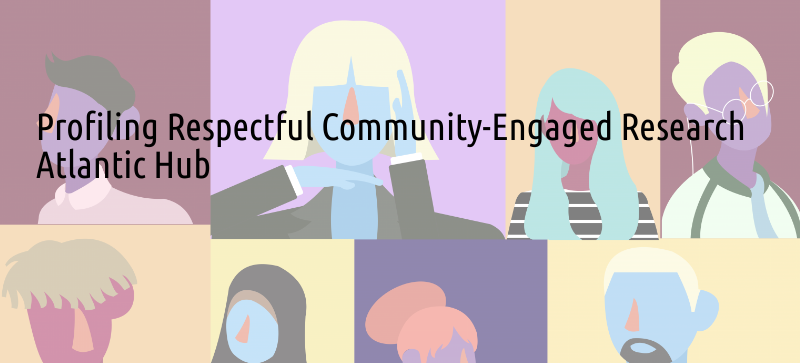By: Sarah Lavallée (new PhiLab undergrad student completing internship Feb-March 2022)

Sarah Lavallée conducting research in Wolfville, Nova Scotia
This past summer, I completed the on-the-ground portion of my undergraduate honours research on the topic of greenspace attachment in a rural, Canadian context. I am studying how the emotional attachments created by community members to greenspaces (parks, trails, woods etc.) can influence a community’s ability to withstand external threats by increasing social cohesion.
My study of this community focused on traditionally under-represented local residents in the university and agricultural town of Wolfville, Nova Scotia: Acadia University students, youth, seniors, and members from Wolfville’s L’Arche community (https://www.larchehomefires.org/l-arche-homefires-wolfville) which supports individuals with physical and mental disabilities. The participants engaged in a series of focus groups along with a photograph and audio-recording assignment that asked them to define the term greenspace and reflect on their emotional attachment to local greenspaces.
While participation in the study involved a significant commitment, I was amazed at the willingness of community members to give of their time, energy, and effort towards a research project that they hoped would benefit their community. I strive to deliver on these promises, and make their time and effort worthwhile. This study became more than simply my honours project, transforming into a personal investment in the well-being and social capacity of the Wolfville community. Although the study is far from finished, I find myself reflecting on the potential that community-based research has for rural, Canadian communities. Through my research, I have witnessed the power of dialogue and knowledge sharing that comes from bringing community members and community organizations together. While this study was partially funded locally– by the town of Wolfville Parks and Recreation Department– I believe there are more opportunities for grant making philanthropy to build capacity for local initiatives benefiting rural communities, for example through CBR.
The older I get, the more I understand how it can take a lot of time, effort, and energy to obtain funding for a research project. Having my study partially funded by the community itself gave greater meaning to the work I was doing, as I know that my results will ultimately be shared with the town council to hopefully influence future greenspace design and management for the benefit of the citizens. The knowledge that my results may benefit the community that I cherish fuels my commitment to meaningfully capture my participants’ perspectives. I want to present results to the town that are useful, meaningful, and that offer new perspectives on the importance of local greenspace.
While I am extremely grateful to the town of Wolfville Parks and Recreation department for their support with this project, I came to realize how the community organizations were as invested in the local greenspace as the town’s Parks and Recreation department. However, the study was designed based on the needs outlined by the latter department. While there were certainly some overlapping needs, I see the potential for community organizations, such as local and national grantmaking organizations, to fund research based on the needs of the community organizations. This financial support could help balance the needs of municipalities with those of other community stakeholders. For example, the participants from l’Arche Homefires had very different perspectives and ideas for greenspace design than any of the other focus groups. L’Arche participants were primarily concerned with accessibility and the need for universal-design in local greenspace. If there was a mechanism for community organizations like l’Arche to engage in grant making opportunities alongside municipal funding for local initiatives, I believe the results would ultimately benefit the community more equitably.
One of the many things I learned from conducting community-based research was the multitude of overlapping and intersecting topics. Although my research focuses specifically on the role of greenspace attachment in community resiliency, I realized that my research was much broader in scope. In fact, it became clear that to meaningfully capture and represent the participants’ and the community’s complex feelings towards greenspace, I would have to veer off from my research questions. One of the greatest challenges was to capture the scope and complexity of the topic without compromising the quality of the results by diluting them with too much information. I learned the importance of quickly switching between my dual roles as both a researcher and community member while facilitating the focus group sessions and that what may seem like a trivial side story could later became an important entry point into previously unconsidered theme or topic. Meaningful community research, from my experience, is as much about the informal moments as it is about the structured format. Relationships are built over time, where trust and comfort between researcher and community members are established through shared jokes, stories, and laughter. While I struggled at times to maintain my presence as a researcher, I felt that in order to ethically represent my participants, I needed to get to know them as people in the community first and foremost.
One of the most significant nuances of community research is the fact that it is a dynamic process of give and take. As a student researcher, it feels daunting at times to have the community invest time, energy, and money into my research, and I certainly feel a sense of responsibility to deliver meaningful results. However, I am also honoured to have the opportunity to give back to a town that has given me so much.
This article is part of the special edition of September 2021: Respectful community engaged research. You can find more information here


